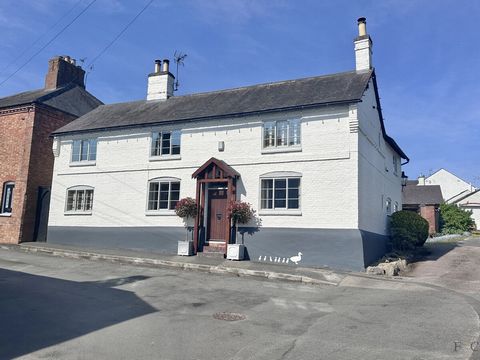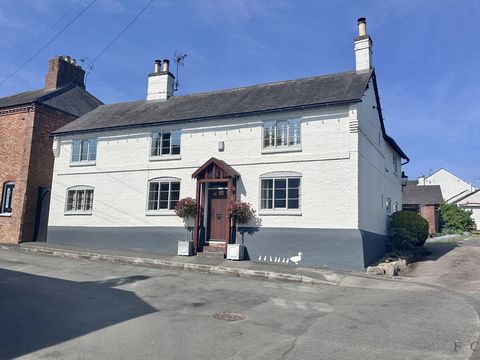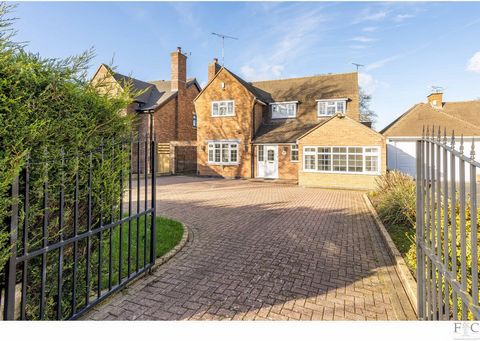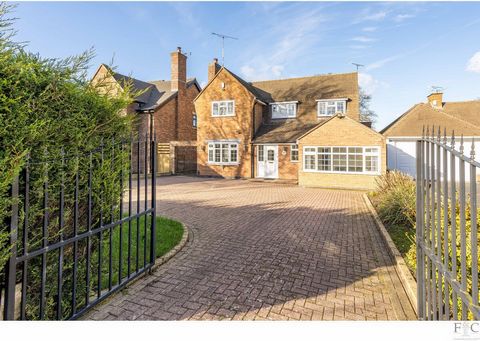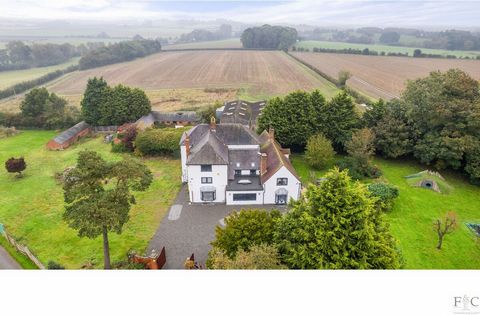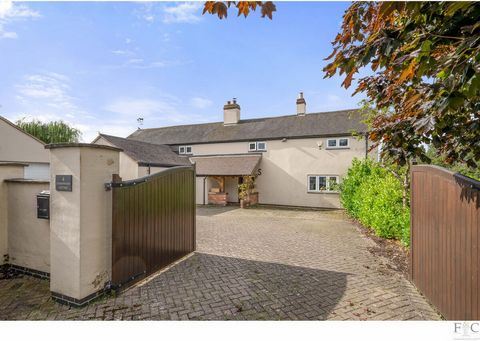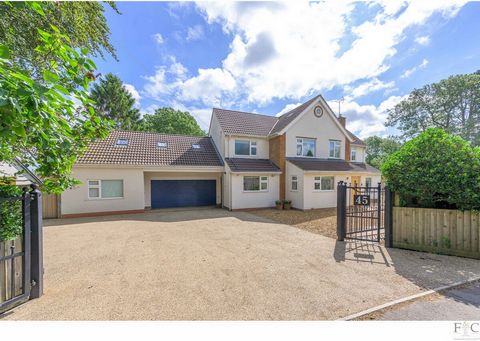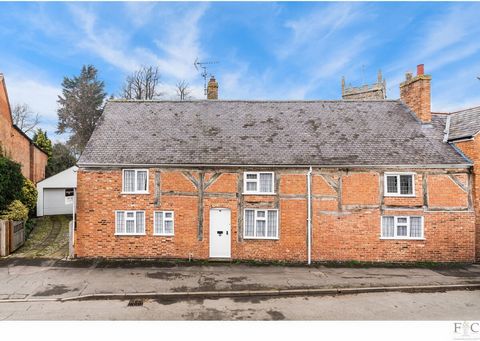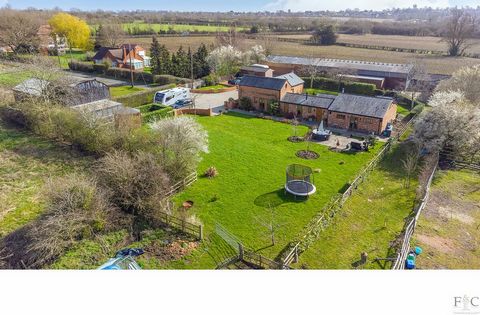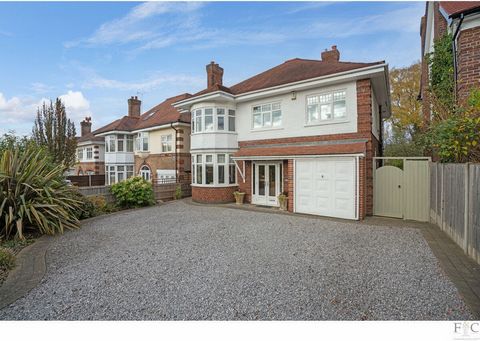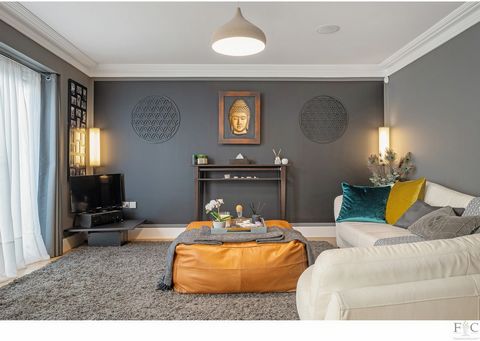‘A period cottage, quintessentially English, filled to the brim with character and charm.’ A little of the back ground story Charnwood Cottage was probably constructed by the original owners during the early seventeenth century. Historical architecture signals to the part of the Renaissance period - 1550 to 1650 - when humble cottages built and owned by farm labourers, began to become part of the countryside narrative. The building materials were those from the locality and in the course of time, dwellings were extended and modernised – thatch to shingle to tile – to accommodate the owners and their needs. As such, this most modest of homes, has gained an unrivalled position within English architectural heritage. They are known for their grace and beauty, and for being harmoniously in tune with their natural landscape. This property, which is offered to you with no upward chain, is a charming example of a half-timbered, old English cottage with large S shaped wall anchors. It presents as a period home of character with features that fulfil contemporary expectations. Charnwood Cottage is a detached, four bedroomed property with three reception rooms and a kitchen diner, utility room and downstairs cloakroom. The prime bedroom is equipped with its own en-suite. Within the landscaped front garden there is a large drive and double garage and at the rear a private, secluded garden. This bespoke residence is set back from Ashby Road, in the south-west region of the county of Leicestershire, in a village known as Stapleton. A welcoming first impression Charnwood Cottage oozes visual warmth and character from the outset: chimney pots, a cross gabled roof, white rendering, leaded paned windows and rustic porch. This is a residence of maturity, richly sprinkled with traits of quirkiness befitting the age of its existence. It has been very well maintained and befitting the character of the original, there is also a simplicity with internal decoration and fittings, which richly appeals to contemporary styles and tastes. From roadside entry through large gates, the herringbone patterned, block paved driveway creates a wide, open front and the double garage and cottage is viewed. There is ample space for several cars and ease of turning. A low brick, open canopy porch adds depth and weather protection over the main point of entrance: there are other options, including a split barn door from the side of the cottage. However, this entrance from the drive leads directly into the dining room. Here, be prepared to step over the threshold where many have trodden before and been transported into a room that exudes period features in abundance. The reception rooms Exposed, mellowed beams, an inglenook fireplace and stone floors create a welcoming entrance to a well-proportioned dining room that has an undressed wall exhibiting the wattle and daub interior. It is a beautiful, characterful room with latched, panelled interior doors, white painted walls and thick rustic timbers bordering the log burner tucked into the recess of the room on the left. This is one of three fireplaces downstairs. They originally served as gathering places for warmth, to dry clothes and to cook meals. The fire was the focal point of the room and in Charnwood Cottage this continues to be the case. The room to the right is the lounge and similar statement period elements are repeated: open beams and arched brick fireplace, stone flooring and the back of the exposed wattle and daub wall. It is a dual aspect room, full of light and charm. Moving back through the dining room, there are two doors immediately ahead. One of them opens onto a staircase leading to the first floor and the second opens into the open plan kitchen diner. This is a wonderful space, created by extending the original structure and doubling the size of the room. A contemporary concept within a period home Many modern homes boast the concept for including open plan living in their floor plan, by removing walls and merging purposed areas into one space. In Charnwood Cottage a clear flow of rooms has been achieved by fusing the kitchen, dining and sitting area together and allowing light to flood the space overlooking the garden, by adding bi folding doors and skylights. It is a space that links the inside to the outside and allows people to be together during food preparation while also providing easy access through rooms that can easily be used together to accommodate larger groups for entertaining. The neutrality of plain, often white, walls or feature wallpapered walls throughout the cottage further supports the traditional interior design and contemporary trends of decorating. In the kitchen, dual aspect windows look to both sides of the property. It is fitted with white panelled cabinetry accessorised with gun metal cup handles. Work tops contrast the colour scheme in black quartz, with plenty of storage space here and next door in the utility room, equipped for all laundry necessities, with another sink and further access to the garden. Within the kitchen, the dishwasher, double oven, extractor fan and wine cooler are included within the sale. A further unit provides a convenient bench for stools and semi division from the seating area, where a wall mounted television is positioned for optimal viewing. The cloakroom with two piece suite is accessed through the utility room and conveniently close to the back door. There are two more doors from the kitchen; one to the walk in store and another to the snug, the last reception room. This room has a bar and is a natural extension of the open plan living space. It could easily become a study or home office, as it also has a door opening into the garden. The dreamy first floor A door from the dining room leads to the carpeted staircase and to the first floor. Here, there is a - prime bedroom with en-suite – walk-in shower, toilet and bespoke vanity unit - three further double bedrooms, a family bathroom and a landing linking them altogether along the length of the property. Period features abound with exposed beams, upright timbers and skirting boards. Fitted wardrobes in the central bedroom have wrought iron hinges and latches, and carpets are fitted to coordinate all the areas with the exception of the bathing areas that are tiled. The family bathroom has a shower over the bath, with glass shower screen and tongue and groove panelling. Besides the two piece suite there is a heated towel rail and white, underground tiling around the window and bathtub. All fixtures and fittings in all the bathing areas of the house have been tastefully selected with premium quality white suites, fitted and maintained to high specifications. A private haven Charnwood Cottage has the luxury of space, inside and outside. The garden has been landscaped and comes stocked with established shrubs, and patio and lawn area. The summerhouse is included within the sale and would certainly provide a delightful place to retreat to and from which to admire the lovely property that is Charnwood Cottage. LOCALITY Stapleton is a village in central England, in south west Leicestershire, a region referred to as the East Midlands. It maintains all the charm and features associated with a rural location and is located on a long ridge of land beginning in the neighbouring village of Barwell to the south and followed by the A447 road going north. The closest major river is the River Sence but locally the closest waterway is the River Tweed, that runs north-east of Leicester. Stapleton is in the LE9 postcode district, falls within the local authority of Hinkley and Bosworth and has the dialling code 01455. In its central location, it is ideally situated for routes that linking up with mayor motorways. The M1 is met at junction 21, north-east towards Leicester Forest East while the M69 is towards the south-east at Nuneaton. There are railway stations in Hinkley, Narborough and Leicester, where the Midland Main Railway Line runs trains to London – Leicester to St Pancras - regularly. There are normally 70 trains running daily, to London, the fastest taking approximately an hour. The closest airport is in Castle Donnington, which is the East Midlands Airport. The village of Stapleton was possibly the geographical cross roads for travellers from Ashby-de-la-Zouch and surrounding areas during the times of the Romans, as Leicester was a large Roman town and trading was very active in and around the area. The earliest recorded mention of a settlement at Stapleton was in 833 when the King of Mercia sent a charter to Wiglaff, Abbot of Crowland in Lincolnshire making ‘grants of two plough lands in Stapleton and Sutton’. In 1086 the Doomsday Book records that there were five to six families living in the area, then owned by Hugh de Grandmesnil, who had been given most of west Leicestershire by the duke of Normandy - William the Conqueror - after the eleventh century Conquest of Britain. The specific date for when the parish church, St Martins, was built remains unknown but possibly dates to around 1300. This is on Church Lane. There is also a Methodist Chapel built in 1852 on Chapel Street in the village, a village hall on School Lane which can be hired for private functions and a local pub, The Nags Head, on Main Street. A large garden centre is on the Ashby Road and Stapleton boasts of its own cricket club. Stapleton is situated approximately ten miles south west of Leicester’s city centre, six mile...
